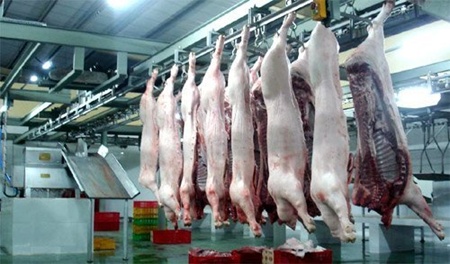
Despite having invested tens of billions of dong, many modern slaughterhouses in Dong Nai province are still struggling to compete with illegal abattoirs.
Despite having invested tens of billions of dong, many modern slaughterhouses in Dong Nai province are still struggling to compete with illegal abattoirs.
 |
Owners said the reasons modern slaughterhouses were less attractive was because of their high prices (needed to cover the investment) and consumers' habits.
Thy Tho slaughterhouse in Long Khanh town's Bau Tram commune, for instance, is now slaughtering just 50 pigs per day, while its capacity is close to 200.
"We only make a profit if we slaughter more than 100 pigs per day, but we're currently operating well below that margin," said Nguyen Quang Tho, owner of the slaughterhouse.
Tho added he had previously bought two hectares of land and invested over VND5 billion (US$240,000) in constructing the slaughter area. "If I had known the situation would be this bad, I would not have invested so much money," Tho said ruefully.
Dong Nai Food Processing Factory is in a similarly sorry plight.
Having opened in Trang Bom district at the end of 2007, the factory offered customers two modern slaughtering lines imported from Europe with capacities of 100 pigs and 2,000 chickens per hour respectively.
Nevertheless, the factory had worked at just 20-30 per cent of capacity since inauguration, according to the factory manager, Nguyen Tuan Phuong.
Phuong said if factory capacity was 300-400 pigs and chickens per day, the slaughtering price would be just VND50-60,000 ($2-3), equal to the prices charged by illegal abattoirs.
However, due to the small volumes and higher "breaking even" point caused by the heavy investment, the price was in fact VND200,000 ($10), Phuong added.
"If we charge our customers too much we will loose them, but if we cut prices to compete with illegal slaughterhouses we will suffer losses. What a dilemma!" Phuong said.
In addition to high prices, slaughterhouses were also losing out due to the Vietnamese habit of buying flesh immediately after slaughter – an unhygienic service only offered by illegal abattoirs, according to Pham Duc Binh, vice chair of the province's Husbandry Association.
"At illegal slaughterhouses, cattle and poultry are slaughtered on the floor, with organs and flesh then stored on site," Binh said.
"But despite this unhygienic way of operating, it chimes with the Vietnamese custom of touching and buying freshly-killed meat at the market, rather than buying cold meat from modern abattoirs."
Regarding measures to tackle the issue, Nguyen Tuan Phuong suggested stricter management of the flesh trade at markets.
"Traders should be asked to submit quarantine certificates before bringing flesh to market for sale. This is an effective method to block meat processed by illegal slaughterhouses", he said.
On one hand, local authorities urge enterprises to provide hygienic fresh meat, but on the other they still allow the operation of illegal abattoirs, according to Nguyen Quang Tho.
Tho said to encourage him to construct his abattoir, the Long Khanh Town People's Committee had promised to regularly inspect and strictly punish illegal slaughterhouses in the area, but they had failed to do so.
Due to loose management from local authorities, illegal abattoirs are still operating normally, instead of suffering business license withdrawal that authorities had promised, Tho added.
The province previously planned to built 36 modern slaughterhouses, but so far only three had been constructed and two were being operated ineffectively, according to Phan Minh Bau, vice head of the provincial Department of Agriculture and Rural Development.
(Source: VNS)




